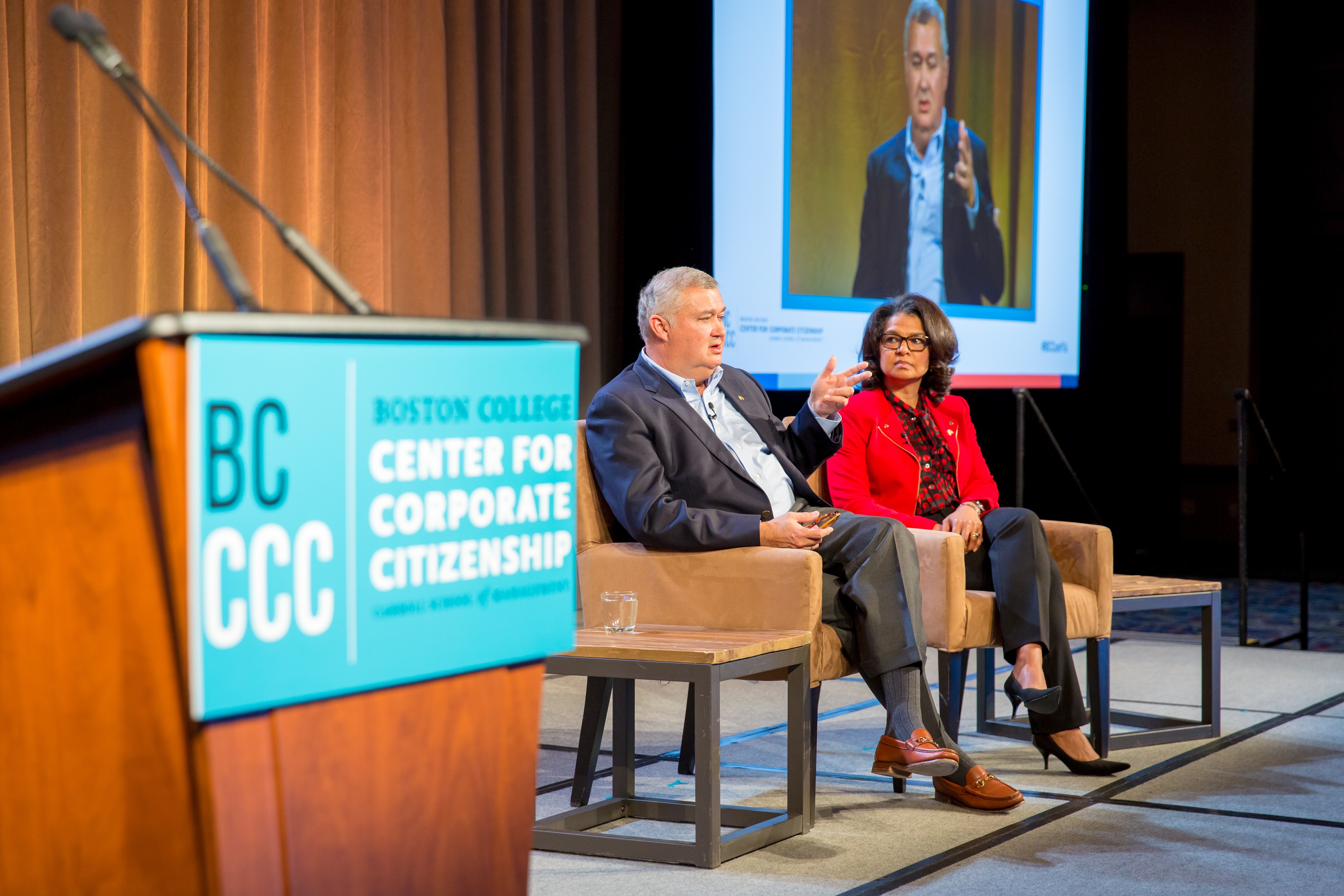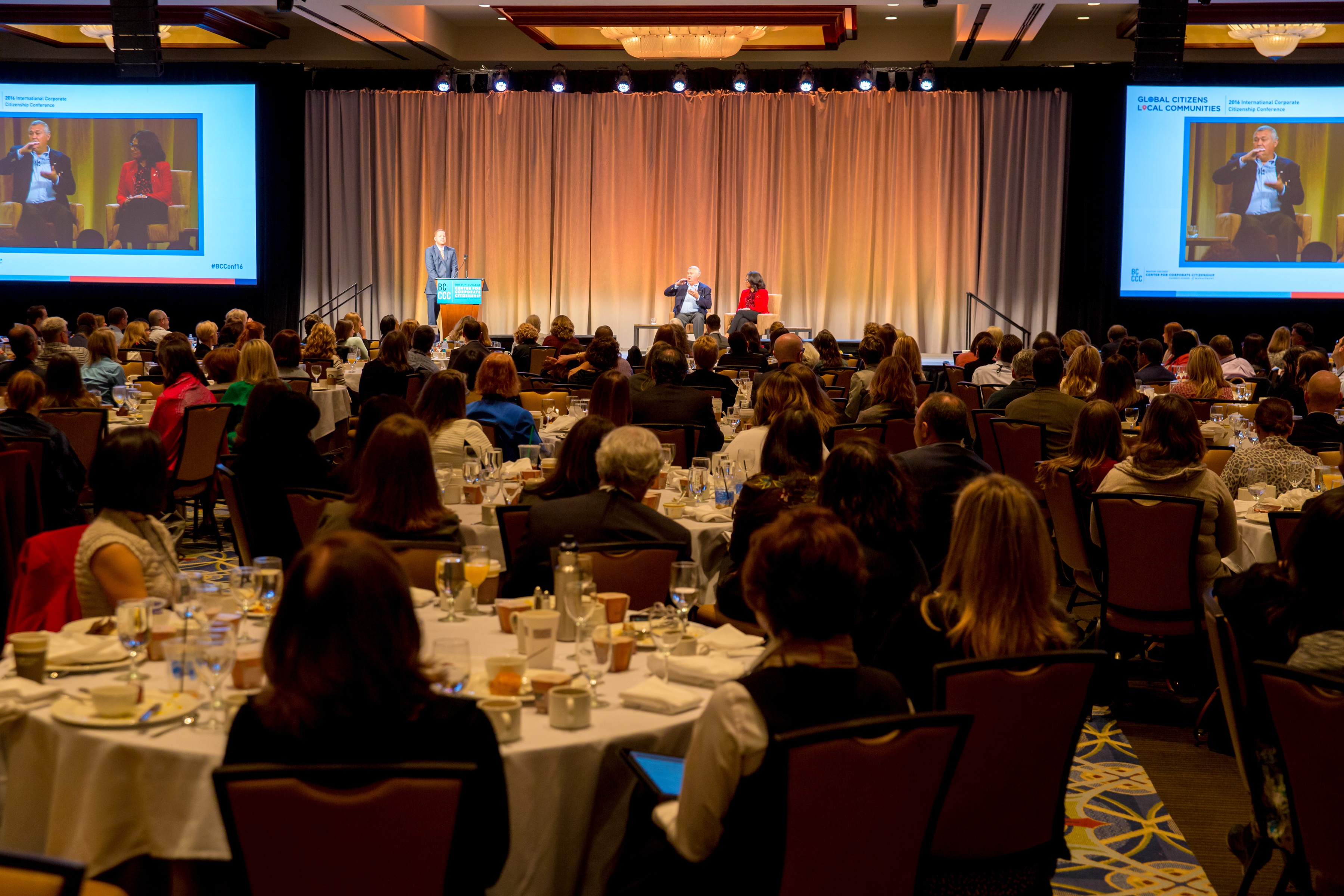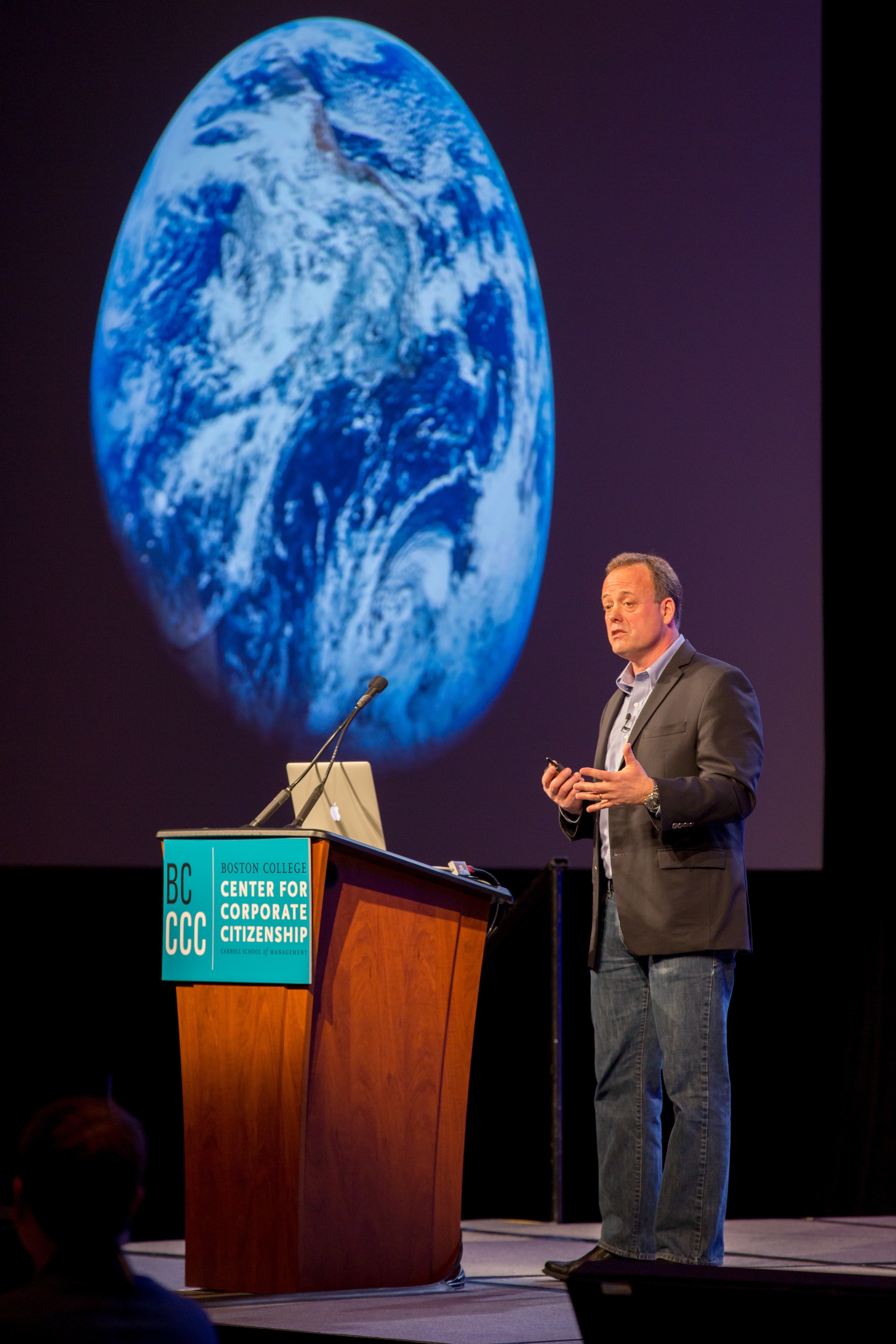Corporate Citizenship Conference Recap Day 3: Taking on the Future Together
- Tue Mar 22 20:03:51 UTC 2016
- Patricia MacKenzie
The final day of the 2016 International Corporate Citizenship Conference was rich with inspiration and ideas, as attendees solidified connections, learned from each other and from experts in the field, and were introduced to next year’s Conference sponsor—State Street—during the event’s closing session.
A transparent look at overcoming challenges
 Following a morning of networking, the approximately 600 CSR professionals attending the Conference gathered for the opening general session, hosted by Wells Fargo. During the session, titled “Wells Fargo’s CSR Journey: The Evolution Toward Greater Impact on Global and Local Issues,” Wells Fargo executives Jon Campbell and Jimmie Paschall held a frank dialogue about the company’s evolving CSR strategy, explaining how they transitioned from a decentralized approach to an enterprise-wide framework. Their transparent discussion highlighted internal challenges—and outlined how they were overcome.
Following a morning of networking, the approximately 600 CSR professionals attending the Conference gathered for the opening general session, hosted by Wells Fargo. During the session, titled “Wells Fargo’s CSR Journey: The Evolution Toward Greater Impact on Global and Local Issues,” Wells Fargo executives Jon Campbell and Jimmie Paschall held a frank dialogue about the company’s evolving CSR strategy, explaining how they transitioned from a decentralized approach to an enterprise-wide framework. Their transparent discussion highlighted internal challenges—and outlined how they were overcome.
Campbell opened the session by candidly expressing the challenges that Wells Fargo—and the financial industry as a whole—has faced since the economic crisis. He pointed to the importance of open stakeholder relationships in changing the common rhetoric and sharing Wells Fargo’s corporate citizenship story.
“What all of us in this room really need to do is listen to stakeholders and figure out what to do in response,” said Campbell. “My team works closely with internal partners to drive responsible practices, and tell our story and how we’re different. Our citizenship is tied to directly to our business, our vision and values, and our longstanding culture of caring for our customers and community.”
Throughout his remarks, Campbell shared examples of how he and his team learned about community needs and developed actions to address them. He was transparent about the internal resistance that that these ambitious efforts often face, and what he did in response. He discussed how timing and tenacity have helped his team overcome barriers within the company.
“Whenever you see a gap—a small window that opens in the conversation—you can’t miss the chance to do something about it, to do something that you’ll be proud of,” he said.
To help guide their efforts, and obtain the data necessary to gain internal alignment, Wells Fargo recently conducted a materiality assessment. The results indicated three key focus areas and inspired a series of measureable goals in three areas, including:
- product/services
- philanthropy
- business process
These goals will not only hold Wells Fargo accountable for its corporate citizenship progress, they will also help the company tell a consistent, comprehensive story.
“We were excited to set some aspiration goals, metrics, and implementation strategies,” Campbell said. “Like you, we spend a lot of time thinking about how we can help move the needle on global issues.”
To help achieve these goals, Paschall and her team are taking a close look at the more than 145 national partnerships that Wells Fargo currently has, assessing whether their giving selection and method should be altered to best support their new strategy.
“We recognized an opportunity to re-envision our strategic philanthropy approach and investment to align across our three new focus areas,” said Paschall. “We are working to align our national partnerships against our social, economic, and environmental priorities, and we partner with these organizations to determine their programmatic ability to help us achieve the outcomes that we’ve chosen to focus on nationally.”
Before opening the session up to a Q&A session full of “gnarly questions and candid answers,” Paschall summed up what she, Campbell, and the Wells Fargo team are working to achieve with their new strategy—the structure and metrics to make the most of powerful partnerships to enact lasting change.
 “Wells Fargo has a powerful opportunity—based on our scope, scale, and relationships in the corporate, nonprofit, and government sectors—to be a force for positive change in the communities where our team members live and work,” she said. “We can’t do it alone, but can convene, partner, and collaborate to inspire innovative and creative solutions.”
“Wells Fargo has a powerful opportunity—based on our scope, scale, and relationships in the corporate, nonprofit, and government sectors—to be a force for positive change in the communities where our team members live and work,” she said. “We can’t do it alone, but can convene, partner, and collaborate to inspire innovative and creative solutions.”
As the session concluded, Conference participants dispersed to attend one of the morning’s breakout sessions, which included a measurement workshop led by Center for Corporate Citizenship Teaching Fellow Susan L. Santos, four panelist discussions, and a company case study during which leaders from FedEx discussed the secrets to creating successful strategic partnerships.
Following the sessions, attendees were again given the opportunity to join Insperity in creating a stuffed animal for a local child in need during the on-site volunteer project.
Addressing humanity’s common challenges
During the afternoon’s breakout sessions, CSR practitioners flocked to their choice of one of five panelist discussions ranging from reputation to K-12 education, and a workshop on stakeholder engagement led by Center for Corporate Citizenship Teaching Fellow Bo Miller.
Then, after a networking lunch, it was time for the final event of the Conference, an exploration of the challenges affecting our globe led by a man with a very unique perspective: astronaut, aquanaut, and social entrepreneur, Ron Garan.
To begin the event, the Center’s Executive Director Katherine V. Smith welcomed the attendees for the final time, thanked them for their engagement, and invited them to the 2017 Conference, to be held in Boston, Massachusetts, with State Street as its convening sponsor. She then welcomed Rick Pearl, vice president and global corporate responsibility officer at State Street. Pearl introduced State Street’s new Boston WINS (Workforce Investment Network) program—which aims to forge a successful pathway from school to career for Boston youth—then welcomed the Garan to the stage.
During his moving session, Garan set out to alter the perspective of the audience on our planet and our global relationships. Beginning with an account of his first time in space, Garan urged the crowd to protect not only our planet, but to take greater care of its inhabitants. Reflecting on his first time seeing the atmosphere, Garan said: “I was struck by the paper-thin layer that was protecting everything in the planet from perishing in the harshness of space.”
It was during this first mission in space that Garan developed the orbital perspective that would influence the way he came to perceive the challenges that are facing our planet and what we all can do to overcome them.
“Being physically detached from the earth made me feel deeply interconnected with everyone on it,” he said. “This is the reality of our lives—that we are part of a living planet. We are one single human family with a common origin and now an awareness of the reality of our common future.”
 The orbital perspective, he argued, is what you do with that awareness. He pointed to collaboration as the key to putting the orbital perspective into action—bringing the collective impact of many brilliant minds to bear on our planet’s problems. To drive his point home, he posed a question to the crowd: “If we have the technology to solve our problems, why don’t we?” he asked. “What would the earth look like if we could have the same sort of collaboration on the ground as we did to create the international space station?”
The orbital perspective, he argued, is what you do with that awareness. He pointed to collaboration as the key to putting the orbital perspective into action—bringing the collective impact of many brilliant minds to bear on our planet’s problems. To drive his point home, he posed a question to the crowd: “If we have the technology to solve our problems, why don’t we?” he asked. “What would the earth look like if we could have the same sort of collaboration on the ground as we did to create the international space station?”
He acknowledged the difficulties of collaboration, but maintained that without it, the global issues facing our society are insurmountable.
“Collaboration doesn’t mean agreeing with each other, it means we are willing to seek out and find the common ground, and use that to build relationships and the foundation of trust that we can use to address the things we don’t agree on,” he said.
To close the session, Garan drew a comparison between the Earth and a space station, and cautioned that unlike the station, we do not currently have a closed life support system on Earth. We are using resources much more quickly than they are replenished, he said, and businesses that don’t take a long-term approach to sustainability now will be at a considerable disadvantage when the constraints of this scarcity come to a crisis-point. The answer to this problem too could only be discovered through collaboration, he argued.
“Open, transparent collaboration can fuel tremendous economic growth,” said Garan. “We need to realize that any one of us or any one organization will not have all the pieces of the puzzle. However, if we do come together, we can make life on our planet as beautiful as it looks in space.”
The Conference closed with Smith once again taking the stage to thank attendees, speakers, and sponsors for the incredible two-plus days of convening the best minds in the corporate citizenship space.
Want more updates on the Conference? Subscribe to the Corporate Citizenship Blog by clicking below.

